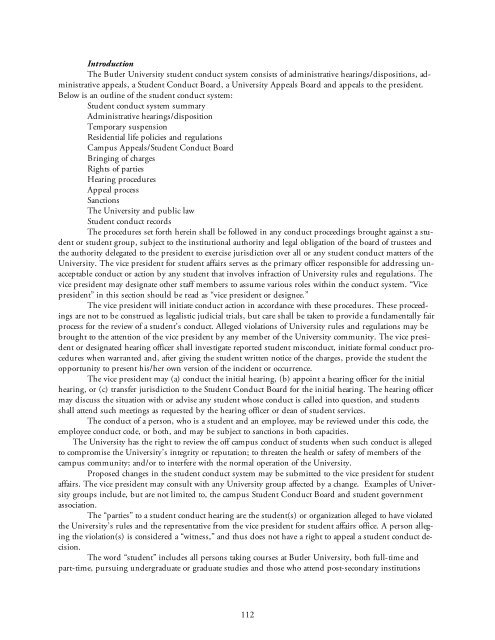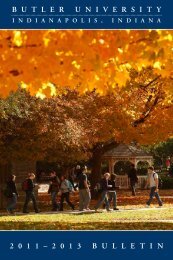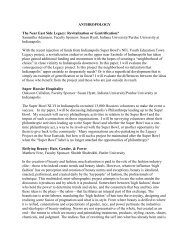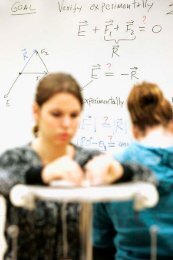Student Handbook - Butler University
Student Handbook - Butler University
Student Handbook - Butler University
You also want an ePaper? Increase the reach of your titles
YUMPU automatically turns print PDFs into web optimized ePapers that Google loves.
Introduction<br />
The <strong>Butler</strong> <strong>University</strong> student conduct system consists of administrative hearings/dispositions, administrative<br />
appeals, a <strong>Student</strong> Conduct Board, a <strong>University</strong> Appeals Board and appeals to the president.<br />
Below is an outline of the student conduct system:<br />
<strong>Student</strong> conduct system summary<br />
Administrative hearings/disposition<br />
Temporary suspension<br />
Residential life policies and regulations<br />
Campus Appeals/<strong>Student</strong> Conduct Board<br />
Bringing of charges<br />
Rights of parties<br />
Hearing procedures<br />
Appeal process<br />
Sanctions<br />
The <strong>University</strong> and public law<br />
<strong>Student</strong> conduct records<br />
The procedures set forth herein shall be followed in any conduct proceedings brought against a student<br />
or student group, subject to the institutional authority and legal obligation of the board of trustees and<br />
the authority delegated to the president to exercise jurisdiction over all or any student conduct matters of the<br />
<strong>University</strong>. The vice president for student affairs serves as the primary officer responsible for addressing unacceptable<br />
conduct or action by any student that involves infraction of <strong>University</strong> rules and regulations. The<br />
vice president may designate other staff members to assume various roles within the conduct system. “Vice<br />
president” in this section should be read as “vice president or designee.”<br />
The vice president will initiate conduct action in accordance with these procedures. These proceedings<br />
are not to be construed as legalistic judicial trials, but care shall be taken to provide a fundamentally fair<br />
process for the review of a student’s conduct. Alleged violations of <strong>University</strong> rules and regulations may be<br />
brought to the attention of the vice president by any member of the <strong>University</strong> community. The vice president<br />
or designated hearing officer shall investigate reported student misconduct, initiate formal conduct procedures<br />
when warranted and, after giving the student written notice of the charges, provide the student the<br />
opportunity to present his/her own version of the incident or occurrence.<br />
The vice president may (a) conduct the initial hearing, (b) appoint a hearing officer for the initial<br />
hearing, or (c) transfer jurisdiction to the <strong>Student</strong> Conduct Board for the initial hearing. The hearing officer<br />
may discuss the situation with or advise any student whose conduct is called into question, and students<br />
shall attend such meetings as requested by the hearing officer or dean of student services.<br />
The conduct of a person, who is a student and an employee, may be reviewed under this code, the<br />
employee conduct code, or both, and may be subject to sanctions in both capacities.<br />
The <strong>University</strong> has the right to review the off campus conduct of students when such conduct is alleged<br />
to compromise the <strong>University</strong>’s integrity or reputation; to threaten the health or safety of members of the<br />
campus community; and/or to interfere with the normal operation of the <strong>University</strong>.<br />
Proposed changes in the student conduct system may be submitted to the vice president for student<br />
affairs. The vice president may consult with any <strong>University</strong> group affected by a change. Examples of <strong>University</strong><br />
groups include, but are not limited to, the campus <strong>Student</strong> Conduct Board and student government<br />
association.<br />
The “parties” to a student conduct hearing are the student(s) or organization alleged to have violated<br />
the <strong>University</strong>’s rules and the representative from the vice president for student affairs office. A person alleging<br />
the violation(s) is considered a “witness,” and thus does not have a right to appeal a student conduct decision.<br />
The word “student” includes all persons taking courses at <strong>Butler</strong> <strong>University</strong>, both full-time and<br />
part-time, pursuing undergraduate or graduate studies and those who attend post-secondary institutions<br />
112
















